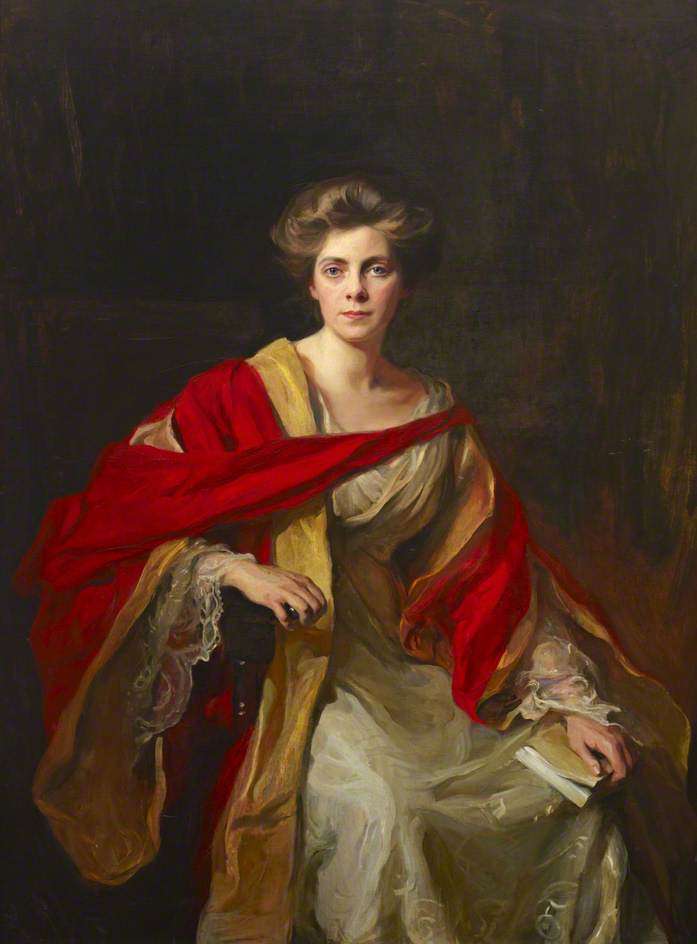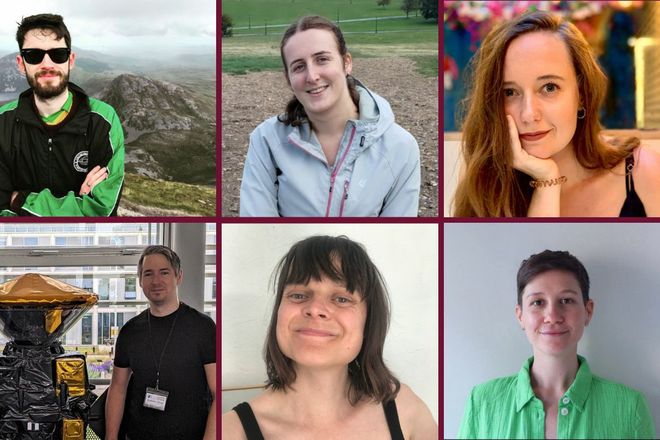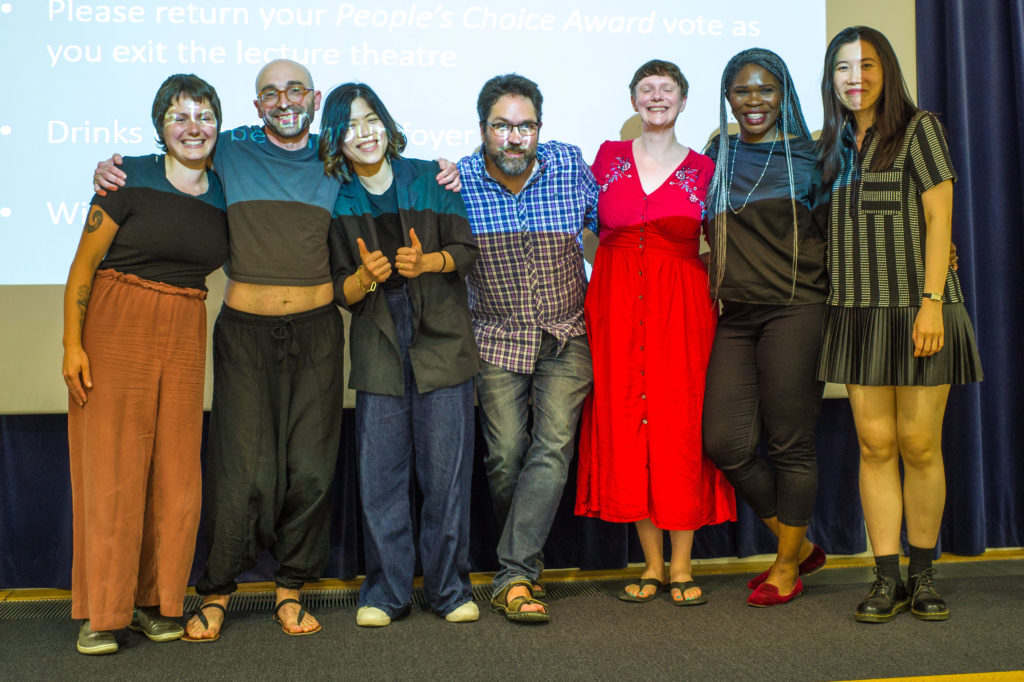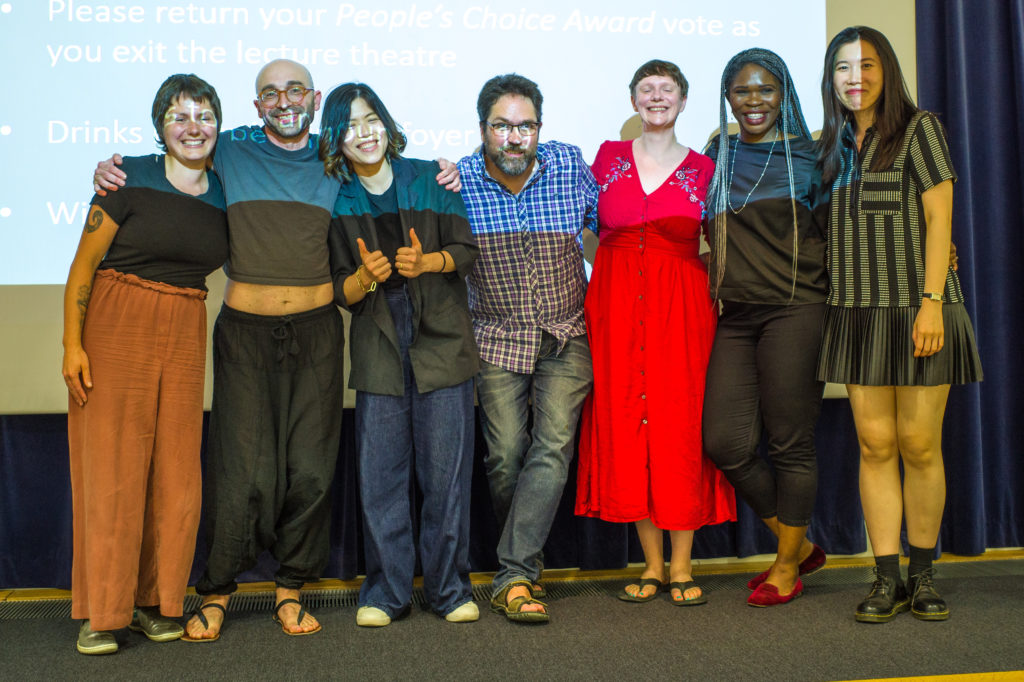Top row left to right: Conor J. Kelly, Jo Brydon-Dickenson, Allison McKibban. Bottom row left to right: Graham Driver, Laura Phillips-Farmer, Clau Di Gianfrancesco
Birkbeck’s annual Three Minute Thesis and Poster competitions were held on 25 May and proved to be an entertaining and invigorating evening for competitors and the audience alike.
For the Three Minute Thesis competition, participants from a range of different disciplines were challenged to present their scholarly research to a non-specialist audience in just three minutes. Showcasing their ability to talk with clarity and passion about their research, as well as their presentation skills, the quality of entries from doctoral students was exceptionally high. For the Poster competition, doctoral students submitted a poster design that explained their complex research to a mixed audience of non-subject specialists.
The winner and recipient of a £500 prize for the Three Minute Thesis was Conor J. Kelly, for his talk entitled ‘Brexit and Northern Ireland’s Political Parties’.
The winner of the Poster competition and recipient of £150 was Graham Driver for ‘Exploring the geological evolution of Glacier-like Forms on Mars’. As well as the winners, a panel of judges also selected runners-up for each competition, and there was also a people’s choice award.
Below is more information about the students who placed as winners and runners-up, and their respective research.
Three Minute Thesis Judges Winner: Conor J. Kelly
Thesis title: Northern Ireland’s Political Parties Shifting Stances on European Integration
What’s it about? Northern Ireland’s political parties have had a huge influence on political developments related to Brexit in recent years. But the parties themselves have often presented contrasting positions on whether they support European integration since Ireland and the UK joined in 1973. There is literature on how parties form their positions on the EU. However, I argue Northern Ireland presents a somewhat unique case, and I try to show why you need to go beyond the current literature on political parties in order to understand how they behave towards Europe.
Why this research? I grew up in Donegal, near the Irish border and I’ve always been interested in the politics and history of Ireland. The 2016 Brexit referendum brought the politics of Northern Ireland back to the top of the political agenda in Ireland, the UK, and the European Union. My thesis is trying to make sense of one dimension of a complicated but fascinating set of political dynamics.
What’s your background? I did my BA at the University of Galway in Ireland and then studied for an MA at Maastricht University in the Netherlands. Prior to coming to Birkbeck in 2018 to do a MRes and then a PhD, I had a variety of different jobs in not-for-profit fundraising in New York and London.
Three Minute Thesis Runner-up: Jo Brydon-Dickenson
Thesis title: Percy Grainger and Trans Identity in Edwardian England
What’s it about? It’s about a musician who wrote a lot about gender and sexuality in their private letters and diaries. I’m using those documents to try to piece together some understanding of what it was like to be trans in London in the early twentieth century and how people like Percy Grainger might have understood themselves.
Why this research? A lot of trans history before the 1950s is built upon court records and newspaper articles, and it’s very rare that we get to hear trans people speaking for ourselves. So, when I came across these documents with Grainger expressing thoughts that will probably seem quite familiar to a lot of trans people today, I thought it was important to take the time to unpick them and show how they might help us understand the trans past.
What’s your background? Before this, I was doing a Master’s at Reading and a degree at Sussex, both with a focus on music and gender in history. My background also includes a lot of performing music, so I love the opportunity to bring the things that I’ve learned as a musician into my research.
Three Minute Thesis People’s Choice Winner: Allison McKibban
Thesis Title: An Era of Violence: Confronting Colonialism in the U.S. Violence Against Women Act (1994-Present)
What’s it about? While laws regulating sexual violence are used by governments around the world, it remains a global health crisis. For 30 years, the U.S. Violence Against Women Act has addressed sexual violence, and in particular, violence against Indigenous women. My research questions why this set of laws hasn’t prevented the violence, through uncovering the ingrained beliefs beneath the words written in the more than 2000 pages of legislation.
Why this research? The United States government has enacted violence against Indigenous communities for centuries. However, as a U.S. citizen, I never learned of this ongoing colonization until I was in university. My research pushes back on my own government’s violent policies, but also has compelled me to do activist work to restore land to Indigenous peoples.
What’s your background? Before Birkbeck, I worked in government affairs in the US and attended LSE and Oxford to study for master’s degrees related to law, gender, and history.
Poster Competition Winner: Graham Driver
Thesis Title: Exploring the Geomorphological Evolution of Glacier-Like Forms on Mars
What’s it about? The mid-latitudes of Mars are populated by numerous water-ice-rich landforms known as Glacier-Like Forms (GLFs) that are similar in appearance to valley glaciers found on Earth. Little is known about these glaciers and how they have evolved over time. Using data collected by orbiting spacecraft, and computer climate modelling, I am attempting to provide insight into the geological evolution of these landforms and discover what environmental factors influence glacial evolution on Mars.
Why this research? I have always been interested in space exploration and geology, particularly in geomorphology and how landscapes are formed. When you think of Mars, you think of a dry, cold, dead planet, not an active landscape with large glaciers on its surface. The difference between what I had known about Mars before and the excitement of what I could discover exploring another planet drew me to this research. It’s an amazing privilege to have the opportunity to look at Mars every day from images I have requested from spacecraft 140 million miles away.
What’s your background? Like many Birkbeck alumni I was working a steady job when, aged 30, I decided to go back to university to study something I have always been passionate about: planetary science. I worked full-time whilst completing my degree at Birkbeck, and graduated in 2019. In 2020, this PhD was advertised at Birkbeck, and I was fortunate enough to be selected for the position. Now I’ve had the opportunity to teach one of the modules which got me here and help other students towards their goals of exploring the geology of our solar system.
Poster Competition Runner-up: Laura Phillips-Farmer
Thesis title: Where structural and individual factors interplay: Building on the pathways approach to homelessness
What’s it about? It’s about looking at the factors involved in why and how people come to face homelessness in the UK. Currently, research is split between ‘individual factors’ or ’structural factors’ or episodes of both types of factors. I would like to explore the spaces where they interplay using Life Course Theory and by focusing particularly on families.
Why this research? Homelessness in the UK is a crisis that many take for granted. Comparisons between countries show that policy makes a huge difference, but it is highly contested over. I wanted to provide research that would give some weight to arguments in these areas. I was keen to slightly dismantle this idea that there’s always going to be some people who are safely in housing and some people who don’t get that, and that there’s something inherent about ’those people’. Homelessness charities sometimes make the point that “we’re all only one or two months of pay away from being homeless”, but it’s more complicated than that, with inequalities being deeper rooted. I want my research to help people tackle that complexity.
What’s your background? I’ve worked as a youth worker, managed a winter night shelter project, and also a support worker for a homelessness charity. I took the Birkbeck conversion MSc in 2019-20, studied a health and social psychology MSc at Maastricht University in the Netherlands the following year, and began my PhD in the summer of 2021.
Poster Competition Runner-up: Clau Di Gianfrancesco
Thesis title: Collective Practices of Undoing and Unbecoming: Masculinity and Theatre of the Oppressed
What’s it about? I am investigating the potentialities held by participatory theatrical practices, and more specifically of Theatre of the Oppressed, in troubling and re-imagining gender and masculinity. In my work, I consider the work of decolonial, antiracist, queer, and feminist thinkers – and specifically, those who have used theatre and performances as privileged sites to question and trouble gender normativity. My aim is to investigate theoretical and practical ways of doing and undoing gender and masculinity. I am using an ethnographic approach, detailing my experience with companies working with Theatre of the Oppressed in different parts of the world.
Why this research? I have been interested in questions pertaining to gender, theatre and gender performances since my BA in Psychology. I find theatre an incredibly helpful and productive medium to explore questions of identity and gender. Given my added interest in collaborative storytelling and collective imagination, I think that theatre and performance offer privileged sites for such rich, artistic, multi-sensorial, embodied and collaborative ways.
What’s your background? While studying for my BA in Psychology, I saw my first Theatre of the Oppressed play which I was so profoundly struck by it that it informed my dissertation. After my BA, I did a Master’s in Psychosocial Studies at Birkbeck, where I learned about a rich variety of theories and methodological approaches and encountered a vibrant community of postgraduate students. After a year of working as a Research Assistant at Goldsmiths in the Department of Sociology, I was awarded the UBEL, ESRC 3+1 scholarship which is currently funding my PhD research.





